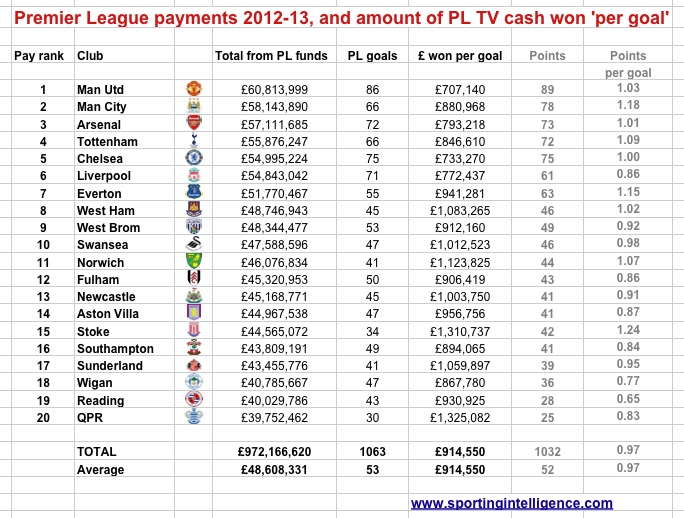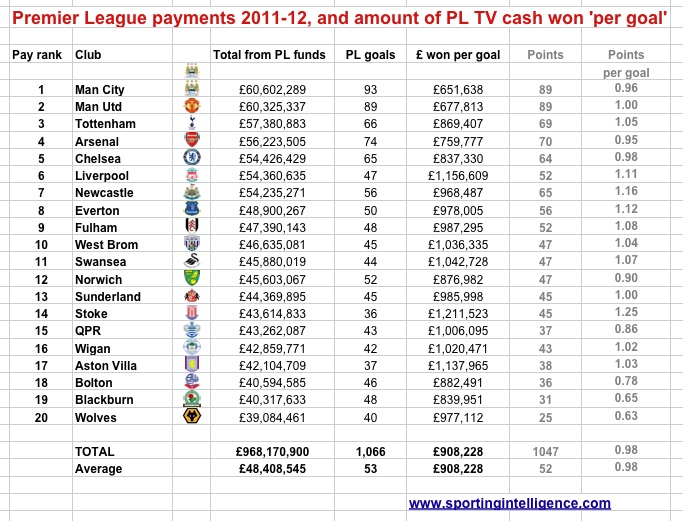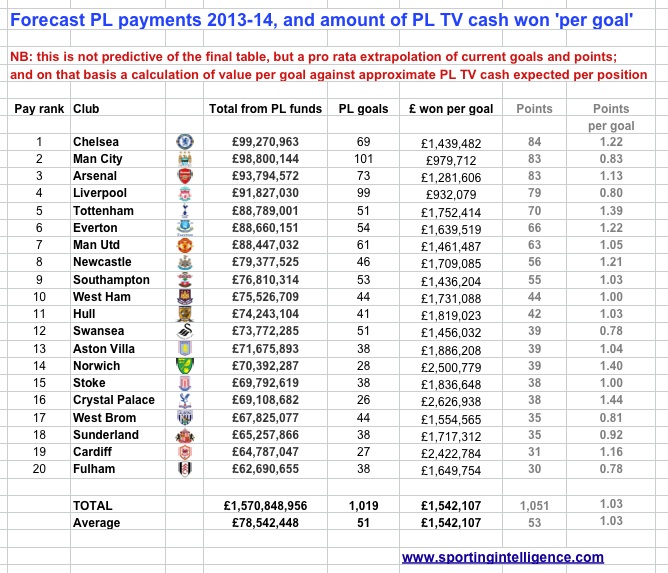By Nick Harris
24 February 2014
Wayne Rooney’s goal for Manchester United on Saturday at Crystal Palace, which came the day after the club confirmed his contract extension until June 2019, prompted inevitable headlines and comment along the lines ‘That’s how to repay a £300,000 per week wage.’
It also got me wondering: how much is a goal in the Premier League worth?
More precisely, given the inflation-busting pay rise Rooney has apparently landed himself, how much is a goal worth in the Premier League this season, under the new TV deals, compared to last season?
First, an answer: each goal in the Premier League last season was worth, on average, £914,550 in ‘prize’ money from central Premier League funds.
(NB, this is an answer, there are multiple ways of answering this question).
The calculation: the 20 clubs received £972,166,620 from central funds combined (average £48.6m per club), and scored a total of 1,063 goals, so the average value per PL goal last season, in PL cash, in effect, was £914,550. The detail per club is in the first graphic below.
And this season? Because of the huge jump in TV revenues and the expected large jump in payments from central funds to the 20 clubs, it looks likely, at current scoring rates, that each goal, on average, will be worth around £1.54m in ‘prize’ money.
The calculation: the 20 clubs will receive somewhere in the region of £1.57 billion from central PL funds between them (average around £78.5m), and at the current rate, we can expect around 1,019 goals, so each will be worth around £1.54m, give or take a few tens of thousands. That’s a hike in the value of each goal by somewhere north of 60 per cent.
One could argue Rooney needs only 11 Premier League goals this season for United to repay his salary; and any other goals in other competitions come free. Why? Because weekly pay of £300k means annual pay of £15.6m, so 11 goals at £1.54m each are worth £16.94m. Rooney has 10 PL goals this season already, including Saturday’s.
But this is not a piece about Rooney and his contract, rather one prompted by it.
Why is a goals value of £915k per goal last season valid?
Premier League football clubs, like all clubs, have income from three three revenue streams:
– match day income (that’s tickets and programmes, pies and prawn sandwiches).
– commercial income (shirt sponsorship, kit deals, merchandise, etcetera).
– media income (TV money basically, from the Premier League, and where applicable, from Uefa for European competitions and from the national bodies for domestic cups).
For the purposes of this exercise, we are looking solely at the Premier League TV income part of the media income – so not match day money at all, not commercial income, just the money paid out by the Premier League as a result of playing in the PL, and achieving whatever each club achieves.
The PL central payments to the clubs are not handed out on the basis of how many goals each team scores, obviously.
The payments are made using a formula where the clubs split parts of the domestic and overseas income, get different amounts depending on appearances on TV, and get more money for each place up the table they finish.
But goals are the currency of football, and goals equate to points (with a remarkable closeness, across the division as a whole), and more points mean more success, and therefore, for the purposes of this exercise, the comparison is between goals and the cash they earn from the success they bring
The first graphic looks at last season in detail. The clubs are ranked in order of how much PL TV money each club received. These are official figures, sourced from the Premier League.
Note the total amount paid out: £972m. And the total goals: 1,063. And the average amount per goal: £914,550.
What is also striking is the relationship between the number of goals and the number of points: 1,032 points won last season for those 1,063 goals, at effectively one point per goal.
And as the graphic shows, most clubs are not very far off this tally of roughly a point per goal, give or take a few ‘outliers’.
Manchester United scored 86 goals and won 89 points, Arsenal scored 73 goals for 72 points, Chelsea scored 75 goals for 75 points, West Ham scored 45 goals for 46 points and so on. Stoke, however, made the most of their relatively few goals (34) in winning 42 points while at the other extreme Reading’s 43 goals mustered only 28 points.
The other thing to note is that goals are ‘worth’ a bit more per goal to those clubs who scored fewest; and a bit less per goal to those who score more.
But the principle is clear, and consistent: the more you score, the more points you win, the more money you get.
Article continues below
.
Last season was not some fluke where goals were worth around one point each, and each goal was worth just more than £900,000 each. Here is what happened the season before, and again the relationship between goals (1,066) and points (1,057) is striking:
Article continues below
.
And this season?
With the new TV deals in place, pouring in hundreds of millions of pounds of new cash thanks to BT Sport entering the bidding (read about that here), and a boom in overseas rights cash, driven by Asian markets (read about that here), the value of being in the Premier League has soared. Which means the value of each goal has risen.
The last graphic attempts to give an approximate forecast of how the TV money will rise per club this season (based on what we know about PL income) and also shows how the table would look if all the clubs current points and goals tallies continue at their current rates between now and the end of the season.
This is not a stats-based prediction of how the final table will look. The extrapolations on points and goals have been made solely so we can calculate the probable approximate ‘value’ of each goal this season.
The graphic is otherwise self-explanatory: goals have got much more valuable. Which is why clubs are able to pay more to those who score them.
Article continues below
.
For more detail about how the Premier League money has been divided up in recent seasons, go here.
.
Follow SPORTINGINTELLIGENCE on Twitter









